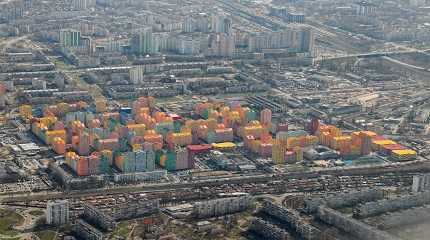
PRZEMYSL, Poland (AP) — Thousands of Ukrainians crossed into neighboring countries to the west in search of safety as Russia pounded their capital and other cities with airstrikes for a second day.
Those arriving were mostly women, children and the elderly after Ukraine’s President Volodymyr Zelenskyy on Thursday banned men of military age from leaving the country.
A woman from the Ukrainian capital, Kyiv, who arrived in Przemsyl, Poland, broke down in tears describing how men were pulled off trains in Ukraine before they got to the border.
“Even if the man was traveling with his own child he couldn’t cross the border, even with a kid,” said the woman, who would only give her first name, Daria.
Vilma Sugar, 68, fled her home in Uzhhorod, Ukraine, shaking in fear, and then faced the heartbreak of her 47-year-son being stopped.
“I’m shaking, I can’t calm down,” she said after reaching Zahony, Hungary. “We crossed the border but they just didn’t let him come with us. We are trying to keep in touch with him on the phone but it’s hard because the line is bad.”
Another woman who arrived on her train, Erzsebet Kovacs, 50, said men were not even allowed to enter the station.
“We women boarded the train, but the men were ordered to step to the side,” she said.
The Ukrainian authorities, she said, “were nice, not rude, but they said that men have a duty to defend the country.”
Cars were backed up for several kilometers (miles) at some border crossings as authorities in Poland, Slovakia, Hungary, Romania and Moldova mobilized to receive them, providing shelter, food and legal help. These countries also eased their usual border procedures, among them COVID-19 testing requirements.
At border crossings in Poland, Ukrainians arrived on foot and by car and train — some with their pets — and were greeted by Polish authorities and volunteers offering them food and hot drinks.
Some sought to join relatives who have already settled in Poland and other EU nations, whose strong economies have for many years attracted Ukrainian workers.
For many the first stop was a train station in Przemysl, a city in southeastern Poland that is a transit point for many. Ukrainians slept on cots and in chairs as they awaited their next moves, relieved to escape the shelling of Kyiv and other places.
Germany’s Foreign Minister Annalena Baerbock said the EU will take in all people fleeing Ukraine due to the current conflict.
“We tried everything so this day wouldn’t come,” she said. “And it came because the Russian president chose it, opted for war and against human lives.”
“That’s why we will take in all of the people who are fleeing now,” Baerbock said. “We will bring the people from Ukraine to safety.”
Italian Premier Mario Draghi spoke in Parliament on Friday of the “long lines of cars leaving Kyiv and other Ukrainian cities, heading mostly toward EU borders,” and said “it is possible to imagine a huge influx of refugees toward neighboring European countries.”
“The images we are seeing -- of unarmed civilians forced to hide in bunkers and subways -- are terrible and bring us back to the darkest days of European history,” he said.
The U.N. refugee agency, UNHCR, estimated that more than 100,000 people were believed to have left their homes in Ukraine and that up to 4 million people may flee to other countries if the situation escalates.
Hungary, which mobilized its military to help, announced in a decree this week that all Ukrainian citizens arriving from Ukraine, and all third-country nationals legally residing there, would be entitled to protection.
The welcome that Poland and Hungary are showing Ukrainians now is very different from the unwelcoming stance they have had toward refugees and migrants from the Middle East and Africa in recent years. Hungary built a wall to keep them out when a million people, many Syrians fleeing war, arrived in Europe in 2015.
Poland is now building its own wall with Belarus after thousands of mostly Middle Eastern migrants sought to enter from Belarus in past months. The EU accused Russia-backed Belarus of encouraging that migration surge to destabilize the EU. Some of those people denied entry into Poland died in forests.
But Ukrainians are viewed very differently by Poles and others because they are mostly Christian, and, for the Poles, fellow Slavs with similar linguistic and cultural roots.
Transcarpathia, Ukraine’s westernmost region which borders Hungary, is also home to about 150,000 ethnic Hungarians, many of whom are also Hungarian citizens. While Russia’s invasion has not yet extended to that area, which is separated from the rest of Ukraine by the Carpathian Mountains, many have decided not to wait for the situation to get worse.




